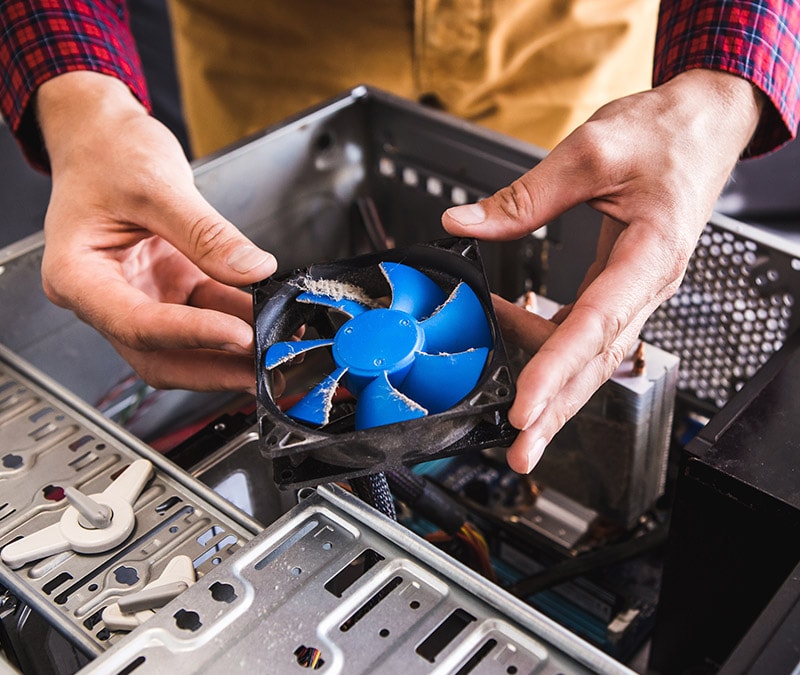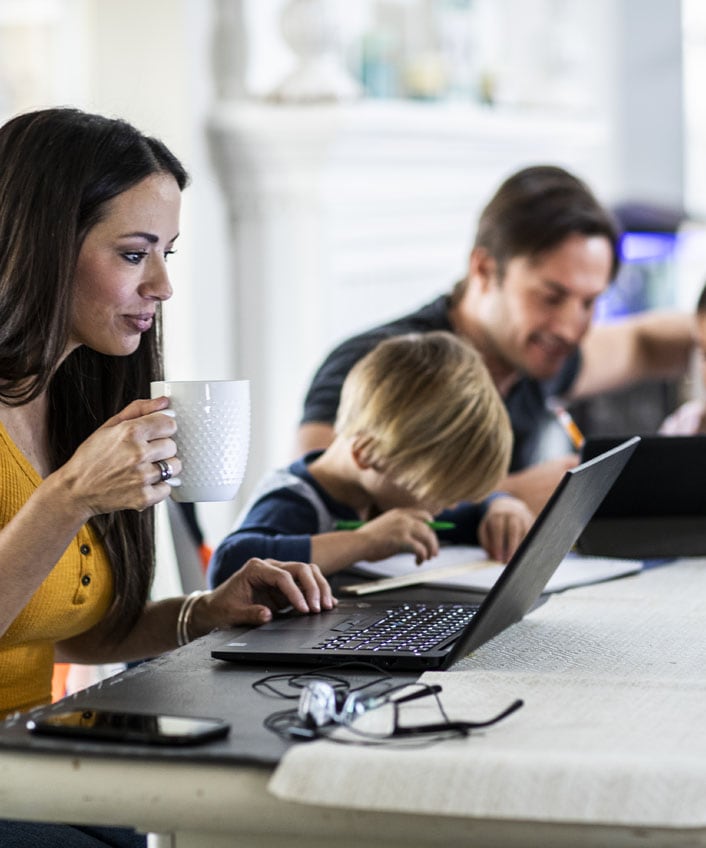Clean PC: In-depth hardware & software cleaning guide

A clean computer is about more than just aesthetics — it's also about longevity and cost savings. Learn about the benefits of regular computer maintenance, from avoiding high repair bills to improving performance to extending your computer’s lifespan. Then get a specialized computer performance tool to help revitalise, optimise, and clean up your PC automatically.
Why clean your computer?
With day-to-day use, your computer accumulates junk and useless files, slowing down your machine. Dust bunnies and other physical issues can also damage your machine and cause it to overheat. Keeping your computer clean inside and out can help increase its lifespan and keep it running smoothly.
Here’s why cleaning your computer is beneficial:
- To enhance performance and longevity: Regularly cleaning your computer's hardware optimises its performance and can extend its lifespan.
- To avoid expensive repairs: A clean PC can prevent serious issues from arising, helping you avoid a costly trip to the repair shop or buying new parts.
- To protect your data: Regularly scanning your computer with antivirus software helps prevent spyware and other malware from infecting your device and potentially compromising your data.
- To boost productivity: Cleaning a dirty monitor and sticky keys will make your experience more pleasurable and boost your productivity. Keeping all your software updated and your hardware in good working order helps speed up your computer and reduce glitches.
- To free up disk space: Cleaning up space by deleting unwanted programs and files will give you more disk space. Don’t wait until you’re desperate for more space and accidentally delete something you need.
How to clean your PC hardware
You need to clean your external hardware like your monitor, mouse, and keyboard — and keep your internal hardware clean too. Most of this can be done with products you probably have at home like a microfibre cloth and cotton buds. You should also buy a can of compressed air, which is excellent for getting rid of dust and debris.
Before you start cleaning your PC
Make sure your computer is turned off and unplugged from the electrical outlet — this is for your safety and to prevent damage to your computer’s hardware. Find a clean workspace free of dust. You may want to move your computer to an area that's well-ventilated, perhaps by an open window or door to let fresh air into the room.
Wipe down your computer
Use a soft, dry cloth to wipe down your computer's exterior. A microfibre cloth is excellent for this purpose. If you need a cleaning fluid for tougher dirt or grime, you can dampen the cloth with a little water. If your monitor is particularly dirty, you can use a solution of 50% white vinegar and 50% water. Gently wipe your monitor and other external surfaces.
Clean your keyboard
Crumbs, dust, and debris can all lead to keys sticking or not working altogether. To clean your keyboard, turn it upside down and gently tap it to dislodge larger debris. To get rid of finer dust, spray some compressed air in a zigzag pattern over your keyboard, keeping the tip of the nozzle at least three centimetres away.
You can clean sticky residue from between the keys using a cotton bud — dip it in surgical spirit (rubbing alcohol) and lightly rub. Next, take a microfibre cloth dipped in a little of the surgical spirit and wipe all over your keyboard. Remember, you never want to get your internal electrics wet, so less is more when it comes to liquid and PCs.
Clean your external mouse
First, unplug your mouse from your computer and remove its batteries. Turn it upside down and give it a light shake. Now, you can gently wipe it with the same surgical spirit you used on your keyboard.
Clean vents and fans
Blow compressed air on your vents to help remove dust. When it comes to your fans, you’ll need to open your computer and blow some air on the fans. This is much easier with a desktop computer.
If you have a modern laptop, you shouldn’t need to take it apart to clean it. Opening a laptop is usually difficult and it can void your warranty. Keeping the vents clean on an ongoing basis should be enough to keep the fans clear of dust.
Clean your surge protector
If you have an external surge protector, power it off and unplug it. Use a soft, dry cloth to gently rub over the surfaces, paying special attention to the area around the power switch, indicator lights, and outlets. You can also use compressed air to clean dust from all the nooks and crannies, holding the nozzle at least three centimetres away.
So, now that you know how to physically clean a laptop or desktop let’s look at how to clean your software.
How to clean your PC software
Keeping your PC software clean is essential if you want your computer to perform at its best and last longer. To keep your software clean, you should make sure it’s up to date. Then work to clear disk space, manage startup programs, and use an antivirus to keep harmful software away.
Use a computer cleanup tool
A quality computer cleaner will help optimise your computer, keeping your PC clean and running at its best. Norton Utilities Ultimate can identify unused apps and get rid of pesky system junk clogging up your computer. It can also turn off programs that are running needlessly in the background to help keep your machine running more smoothly and quietly.
Update software
Software updates often come with patches that clean up glitches and improve the way your programs talk to each other. If you don’t have automated software updates set, manually check that your programs and operating system (OS) are updated. Outdated software is also more susceptible to viruses and other malware, like Trojans, worms, and adware.
Delete unused apps
Apps and programs can take up a huge amount of space, clogging up your hard disk. Some of these may run in the background, even if you don’t have them open, so it’s best to delete any programs you don’t use.
Disable startup programs
Programs can be set to launch at startup even though they don’t need to. While this is useful if you actually use them immediately upon startup, they drain system resources. The more startup items you have, the longer Windows will take to boot up and the slower your machine will run.
Remove system junk
Over time, your apps and OS generate obsolete files that take up valuable disk space. These junk files can be hard to find, especially if you don’t know what you’re looking for. You can use a computer cleanup tool to find and remove these for you.
Use a strong antivirus program
Keeping your computer software and hardware clean is great digital hygiene. But you shouldn’t neglect active protection against malware. Norton AntiVirus Plus can help safeguard your device against viruses and other malware that can clutter your computer and pose serious security risks. Norton 360 is an award-winning antivirus that can help keep your PC safer.
How often should I clean my PC?
How often you should clean the outside of your computer depends on factors such as the environment it’s kept in, usage patterns, and personal preference. Generally, a light dusting and wipe every three to six months is recommended. For a deeper clean, get the compressed air out every six months to a year to ensure peak performance and prevent overheating.
Cleaning your computer's software and keeping it maintained should be ongoing to avoid performance issues and prolonged stress on components. A specialize, automated cleaning app can help extend the lifespan of your computer. Use a tool like Norton Utilities Ultimate to take the guesswork and hard work out of the internal cleaning regime.
Ongoing PC maintenance tips
In between your scheduled cleaning sessions, there are a couple good PC hygiene practices that you should keep in mind:
- Keep your device well-ventilated and free of obstructions to help prevent overheating. If you have a laptop, always use it on a hard surface rather than a soft one like your lap or pillow.
- Use an automated software updater to make sure your programs are running the latest versions. Otherwise, regularly check your apps and OS for updates and manually push them through.
Clean your computer with Norton Utilities Ultimate
Cleaning a PC is more than just a routine — it's an investment in performance, security, and the longevity of your computer. By prioritising your computer's well-being, you'll not only save on future repair costs but also enjoy a better user experience.
Norton Utilities Ultimate is your ideal ally to keep your digital companion clear of clutter. It will automatically help you remove junk files, turn off unnecessary background processes, and keep your browsing data clean. Plus, Norton Utilities Ultimate comes with other great features like a built-in file shredding tool that uses advanced techniques to overwrite data you need to delete permanently.
Editorial note: Our articles provide educational information for you. Our offerings may not cover or protect against every type of crime, fraud, or threat we write about. Our goal is to increase awareness about Cyber Safety. Please review complete Terms during enrollment or setup. Remember that no one can prevent all identity theft or cybercrime, and that LifeLock does not monitor all transactions at all businesses. The Norton and LifeLock brands are part of Gen Digital Inc.





Want more?
Follow us for all the latest news, tips and updates.